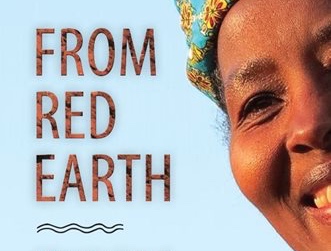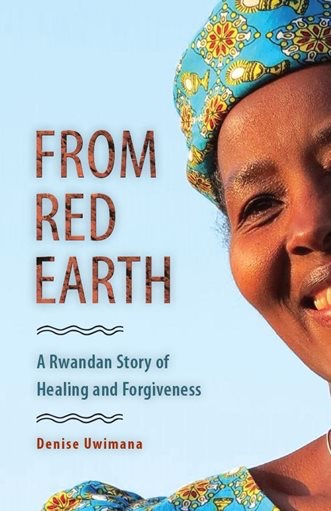
DAVID ADAMS reads Denise Uwimana’s memoir of her experiences during the Rwanda genocide – and its aftermath…
Denise Uwimana
From Red Earth: A Rwandan Story of Healing and Forgiveness
Plough Publishing House, New York, 2019
ISBN-13: 978-0874869842

“I’ve read numerous accounts of what happened during that horrific period of just over three months but Denise Uwimana, who lived through it to tell her story and who went on to found Iriba Shalom International – an organisation dedicated to helping survivors and their children, paints an incredibly vivid, tragic and, despite all she witnessed, ultimately hopeful picture that one can’t but be deeply impacted by.”
It’s one of the most shocking and hard to comprehend events of the 20th century – 100 days of madness in Rwanda during which almost a million Tutsis were kicked in a frenzy of violence which became known as the Rwandan genocide.
I’ve read numerous accounts of what happened during that horrific period of just over three months but Denise Uwimana, who lived through it to tell her story and who went on to found Iriba Shalom International – an organisation dedicated to helping survivors and their children, paints an incredibly vivid, tragic and, despite all she witnessed, ultimately hopeful picture that one can’t but be deeply impacted by.
From Red Earth opens on 7th April, 1994, the day the genocide began (as Uwimana explains, just as people remember where they were when news of the planes hitting the Twin Towers in New York reached them, so too do Rwandans remember where they were when the genocide started). Living without her husband in their home in Bugarama in the country’s southern tip (her husband Charles had been forced to move away two-and-a-half years before due to rising tensions), she writes of how, heavily pregnant with their third child, she had turned on the radio to listen to the news but instead heard nothing but classical music.
It was only when she spoke to her neighbour that she was told the plane of President Habyarimana, a Hutu, had been shot down the previous night and recalled feeling that, “without a doubt – we Tutsi would pay”. But, as she goes on to add, her worst forebodings “did not come close to the nightmare before us”.
As Uwimana recounts her life has been marked by the conflict between Hutu and Tutsi “even before I was born”. When the country had gained independence from Belgium in 1962 under a Hutu government, her parents, both Tutsi, had fled to neighbouring Burundi and it was there that she was born in a mission hospital and spent her early childhood before later moving to the Congo so her father, who had some medical training, could continue his studies. It was during that time that she became a Christian and was baptised on Christmas Eve, 1977, at the age of 13.
Uwimana moved to the town of Bugarama in Rwanda in the mid-1980s after hearing of a job opportunity at a cement processing factory and while there met Charles, the man she would marry and then settle in Bugarama with to raise their family. Conflict between Hutu and Tutsi was always brewing in the background but after the Rwandan Patriotic Front, made up mainly of Tutsi exiles and refugees who had fled Rwanda, invaded in 1990, things took a turn for the worse and her husband was detained. He spent six months in jail but after he was released was fired from his job and, as a result of ill-feeling towards Tutsis in the area, decided to live incognito in the capital of Kigali while Denise remained in Bugarama.
He was still living away when the violence broke out in April, 1994. “How gladly I would forget all I saw that day [16th April, the day the killing arrived in Bugarama],” Denise recalls, “but – as war veterans can confirm – such images are seared into the brain as if by a camera’s flash”.
Uwimana says she decided to write the events that she saw, horrific as they were, firstly, because she feels she owed it to the people who died – “if I don’t tell, who will even know that they lived?” – and, secondly, for the sake of history.
“If a nation’s shameful deeds are not to be repeated, they must be recognised and remembered – not swept under the rug”.
Even as she recounts the horrors of what she saw and experienced (including not knowing if her husband was dead), Uwimana credits her faith in God – as well as various Hutus who helped her – with her survival. And it’s thanks to her Christian faith that, like others she mentions in the book, she has been able to forgive and heal.
She recalls in one passage, her struggle with forgiving those who had killed her family members and friends and hearing God tell her that just as she only survived by grace, so she must give that grace to others.
“Throughout the genocide, I had accused God, doubting his love, succumbing to the thought that he loved only Hutu. Now, at last, I knew that he understood my inner battles and welcomed me as his child. His love overwhelmed me. Right then, I discovered I could genuinely pardon my Hutu neighbours…From this moment fear no longer held me back; hate no longer pinned me down.”
Uwimana goes on to recount how she joined with others in the process of healing and forgiveness and we’re introduced to the stories of other survivors and how God, as one lady put it, “healed our wounds step-by-step, and brought peace to our broken hearts”.
It’s these stories – and the ongoing work of reconciliation that Uwimana and her now husband Dr Wolfgang Reinhardt are involved with – which make up the latter part of the book.
This is a tough read, no question, but it tells a story we all need to hear.





